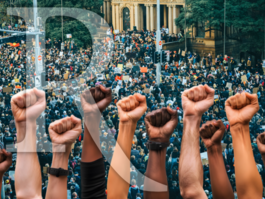Making Life Fair
A Commentary By John Stossel
When my wife was a liberal, she complained that libertarian reasoning is coldhearted. Since markets produce winners and losers -- and many losers did nothing wrong -- market competition is cruel. It must seem so. President Obama used the word "fair" in his last State of the Union address nine times.
We are imprinted to prefer a world that is "fair." Our close relatives the chimpanzees freak out when one chimp gets more than his fair share, so zookeepers are careful about food portions. Chimps are hardwired to get angry when they think they've been cheated -- and so are we.
Filmmaker Michael Moore took this notion about fairness to its intuitive conclusion during an interview with Laura Flanders of GRITtv, saying of rich people's fortunes: "That's not theirs! That's a national resource! That's ours!" As is typical, Moore was confused or disingenuous. In our corporatist economy, some fortunes are indeed made illegitimately though political means. The privileges that produce those fortunes should be abolished. But contrary to Moore, incomes are not "national resources." If he's concerned with illegitimate fortunes, he should favor freeing markets.
Fairness is related to justice, the recognition of people's rights to their own lives.
A free market will create big differences in wealth. That wealth disparity is simply a byproduct of freedom -- vastly diverse individuals competing to serve consumers will arrive at vastly diverse outcomes.
That disparity is not unfair -- if it results from free exchange.
The free market (which, sadly, America doesn't have) is fair. It also produces better outcomes. Even "losers" do pretty well.
A more astute observer than Moore might show how unfair government intervention is. Licenses, taxes, regulations and corporate subsidies make it harder for the average worker to start his own business, to go from being a "little guy" to being an independent owner of means of production. Most new businesses fail, but running your own business is the best route to prosperity and -- surveys suggest -- happiness, too.
I once opened a dinky business called "The Stossel Store" in Delaware, hawking hats, books and other goodies on the street. It was hard to open this store. I chose Delaware because it's supposedly the state that makes that easiest -- but "easiest" didn't mean "easy." I still required help from Fox's lawyers to get the permits, and the process took more than a week. In my hometown, New York City, it would have taken much longer.
By contrast, in Hong Kong, I started a business in one day. Hong Kong's limited government makes it easy for people to try things, and that has allowed poor people to prosper. Regular people benefit most from economic freedom.
What makes it hard for people to embrace markets is that anti-market zealots, with their talk of Americans pulling together to take care of one another, remind us of the coziness of village life. Instinct tells us that's where we'll find trust -- and fairness.
But our intuition fools us when it leads us to think that government models that institutionalize what resembles village life must be good. Assuming that government can foster togetherness better than our own voluntary associations, businesses and private charities leads to coziness of the bad kind: back-room dealings between the well-connected and government.
If we're going to have a large-scale, modern society, we need relatively simple rules that respect individual rights and that can be applied to all sorts of new situations without having to put global commerce on hold until the hypothetical village elders come up with a plan.
Since most human beings still lived as farmers two centuries ago, the idea of stranger-filled cosmopolitan life outside the small, close-knit village is still novel. It was only around the 18th and 19th centuries that the ideas we now think of as classical liberalism, libertarianism, anarchism and laissez faire began to be articulated. As Westerners became accustomed to living without the rule of kings, aristocrats and village elders, they began, for the first time since the dawn of writing, to imagine living ungoverned lives.
Sure, it's scary, but surrendering your fate to politicians and bureaucrats is a lot scarier.
John Stossel is host of "Stossel" on the Fox Business Network. He's the author of "Give Me a Break" and of "Myth, Lies, and Downright Stupidity."
COPYRIGHT 2012 BY JFS PRODUCTIONS, INC.
DISTRIBUTED BY CREATORS.COM
See Other Political Commentary
See Other Commentary by John Stossel
Views expressed in this column are those of the author, not those of Rasmussen Reports. Comments about this content should be directed to the author or syndicate.
Rasmussen Reports is a media company specializing in the collection, publication and distribution of public opinion information.
We conduct public opinion polls on a variety of topics to inform our audience on events in the news and other topics of interest. To ensure editorial control and independence, we pay for the polls ourselves and generate revenue through the sale of subscriptions, sponsorships, and advertising. Nightly polling on politics, business and lifestyle topics provides the content to update the Rasmussen Reports web site many times each day. If it's in the news, it's in our polls. Additionally, the data drives a daily update newsletter and various media outlets across the country.
Some information, including the Rasmussen Reports daily Presidential Tracking Poll and commentaries are available for free to the general public. Subscriptions are available for $4.95 a month or 34.95 a year that provide subscribers with exclusive access to more than 20 stories per week on upcoming elections, consumer confidence, and issues that affect us all. For those who are really into the numbers, Platinum Members can review demographic crosstabs and a full history of our data.
To learn more about our methodology, click here.



